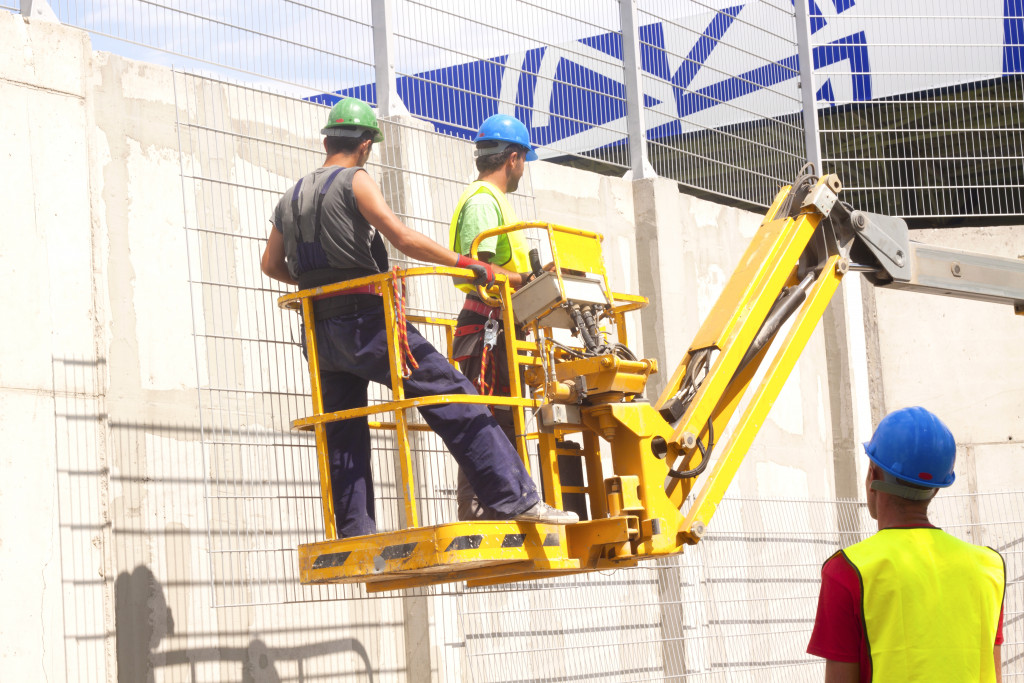Running a construction business is no easy task. There are so many things to keep in mind, from ensuring the safety of your workers to making sure you stay on schedule and within budget. To make things a little easier for yourself, adopting some best practices into your workflow can be helpful. Here are seven best practices that we recommend for construction businesses:
1. Employ Quality Equipment to Prevent Accidents
Adopting a safety-first approach in your construction business is responsible and makes good business sense. Accidents on construction sites can be costly in terms of property damage and potential lawsuits.
Investing in quality equipment and implementing safety protocols can help prevent accidents and keep your business running smoothly. Take the example of lifting heavy things during construction. In this case, you will need forklifts and excavators to get the job done. But besides that, you will also need rope pulley blocks to ensure that everything is safely lifted and moved around the construction site. You can find pulley blocks for cranes, sheaves, swivels, and other equipment and machinery.
2. Enforce a Strict Safety Policy
Construction workers are at a higher risk of on-the-job accidents than workers in other industries. The Occupational Safety and Health Administration (OSHA) reports more than 200,000 construction site accidents yearly. Many of these accidents are preventable, however, and a strict safety policy can help reduce the number of casualties.
Some elements of an effective safety policy include regular safety meetings, clearly marked hazards, and a system for reporting unsafe conditions. Enforcing a strict safety policy will not only help to protect your workers, but it will also improve your bottom line by reducing worker’s compensation claims and lost productivity.
3. Keep Your Workspace Clean and Organized
Construction sites are often chaotic and cluttered, increasing the risk of injuries. That’s why it’s essential to keep your workspace clean and organized. A tidy construction site is a safe construction site. By taking some simple precautions, you can help to prevent accidents and keep your workers safe:
- Ensure all tools and materials are properly stored when not in use.
- Keep walkways clear of debris and tripping hazards.
- Ensure that electrical cords are properly secured and out of the way.
4. Hire Reliable Workers
Hiring workers with a proven safety track record can help prevent accidents in your construction business. Of course, no worker is 100% accident-proof, but by carefully screening applicants and maintaining a strict safety policy, you can minimize the risk of accidents in your workplace. By outlining specific procedures for every type of work, you can help to ensure that all workers know what to do in case of an accident.

5. Create a Detailed Schedule
Any business owner in the construction industry knows that accidents can happen on the job site. Injuries to employees and damage to equipment can lead to costly delays and lost revenue. However, there are some simple steps that you can take to help prevent accidents in your business.
First, create a detailed schedule for each day’s work. This will ensure that everyone knows what tasks must be completed and when. Second, make sure that all employees are adequately trained in safety procedures. Third, provide adequate supervision to workers, especially those new to the job site.
6. Stay Within Budget
There are many reasons why construction projects tend to go over budget, but one of the most common is unexpected repairs. When accidents happen on the job site, they can often lead to costly repairs. To help prevent this from happening, you should create a contingency fund for unexpected expenses. Setting aside money for unexpected repairs can help keep your project on budget and avoid financial difficulties down the road.
7. Communicate With Your Client
Construction businesses are built on relationships. Good communication with your clients is essential to maintaining a healthy working relationship and preventing accidents. Here are some tips for communicating with your clients to avoid accidents:
Be clear and concise in your communication. Your clients should understand your expectations and instructions. Ambiguous or confusing communication can lead to misunderstandings and accidents.
Listen to your clients. They may have concerns or questions that you haven’t considered. If you take the time to listen to their concerns, you may be able to prevent an accident before it happens.
Follow up with your clients. After communicating your expectations, follow up with your clients to ensure they understand and follow your instructions. This will help to prevent accidents caused by miscommunication.
By following these best practices, you can help to prevent accidents in your construction business. You can create a safe and successful business by hiring reliable workers, staying within budget, and communicating effectively with your clients.



